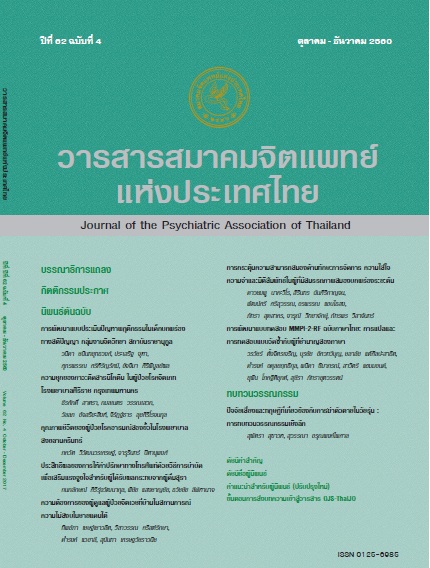การพัฒนาแบบประเมินปัญหาพฤติกรรม ในเด็กบกพร่องทางสติปัญญา กลุ่มงานจิตวิทยา สถาบันราชานุกูล
Main Article Content
Abstract
Objective : To develop the evaluation of behavior problems for assessing behavioral
progression of intellectual disability children in Psychological Service, Rajanukul Institute.
Methods : The evaluation of behavior problems for children with intellectual disability
was developed. Initially, the original framework of the evaluation of behavior problems
was drafted from qualitative procedures; for example, reviewing relevant documents
and research studies both in Thailand and international countries, observation of client
behavior and conducting a focus group in experienced clinical psychologists. The
evaluation draft was evaluated by content validity or using index of item-objective
congruence (IOC) from 5 experts and interrater reliability testing between 2 observers
using 32 subjects. The acceptable result of interrater reliability testing is reliability
coefficient above 80%.
Results : The evaluation of behavior problems for children with intellectual disability
consist of 4 versions such as for 0-2 years (19 items), 3-5 years (35 items), 6-12 years
(35 items) and 13-18 years and 7 domains of behaviour problems in children with
intellectual disability (self-control, attention, perception and follow an order, emotion,
inappropriate behaviour, social behaviour and other behavior problems). Over 80
percent of experts’ agreement for version of 3-18 years was approved (IOC > 0.5);
however, the evaluation for 0 - 2 years should be improved. In interrater reliability
testing, there is acceptable reliability coefficient for all versions (> 80 percent).
Conclusion: The evaluation of behavior problems can be used to assess behavior
problems of children with intellectual disability; especially, in the setting of behavioural
modification, Psychological Service, Rajanukul Institute.
Article Details
Articles submitted for consideration must not have been previously published or accepted for publication in any other journal, and must not be under review by any other journal.


